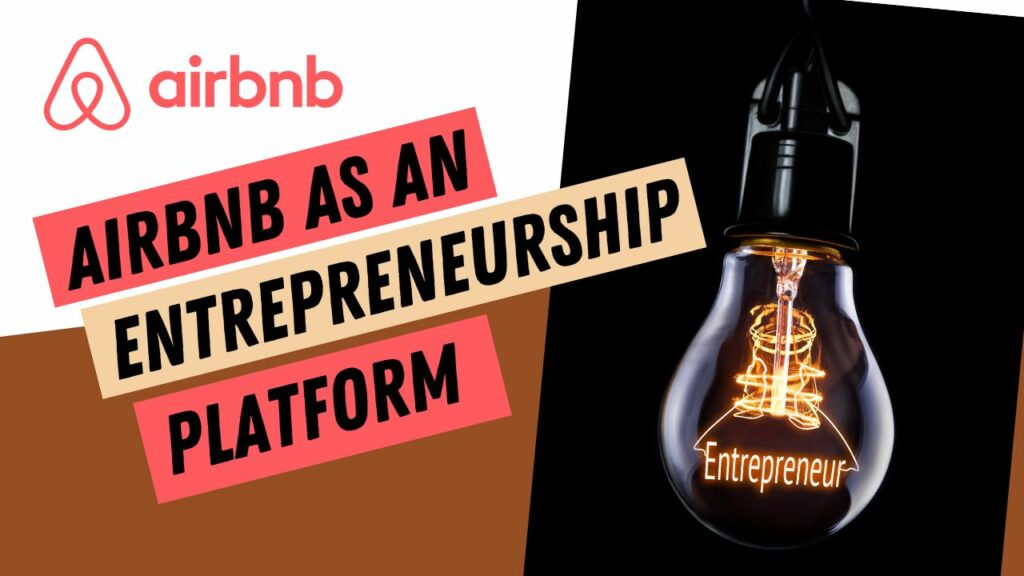If you’re an Airbnb host or property manager, you may have already noticed how Airbnb has become a platform for entrepreneurship, enabling individuals and small businesses to tap into the global tourism market. But have you ever wondered why Airbnb is so committed to this approach? In this article, we will uncover the hidden strategy behind Airbnb’s platform for entrepreneurship and how it is creating a virtuous cycle of growth and innovation. And that’s not all. We will also mention Airbnb’s rumored marketplace of free and paid vendor services for hosts, set to launch in 2024. Get ready to discover why Airbnb’s unique approach to entrepreneurship is more than just a hospitality platform.
Why Airbnb is a Platform for Entrepreneurship
Airbnb has an unmatched capacity to create and federate hospitality entrepreneurs. From occasional hosts renting their place for a few weeks a year to hosts building Airbnb empires and becoming full-time property managers, Airbnb has created a platform that enables entrepreneurship at all levels. This has allowed Airbnb to build several network effects that benefit the platform, such as more hosts attracting more guests and vice versa.
How Airbnb is Working with Entrepreneurs
Airbnb’s strategy of leveraging entrepreneurship has taken several forms. Here are some examples:
- Airbnb counts more than 4 million hosts, representing more than 6.5 million listings
- The Airbnb Entrepreneurship Academy partners with non-profit organizations, small business centers, and academic institutions to support tourism entrepreneurship in local communities. Through the Entrepreneurship Academy, Airbnb has helped over 1,000 participants from underrepresented communities learn about hosting.
- In 2022, Airbnb launched its Airbnb-Friendly marketplace, where tenants can find Airbnb-friendly properties to let sublet on Airbnb.
How Airbnb is Connecting Different Categories of Entrepreneurs
Airbnb is also using its platform to connect various categories of entrepreneurs, such as hosts and co-hosts, hosts and property managers, and potentially in 2024, hosts and service providers. Here are some examples:
- Ask a Superhost (now part of Airbnb Setup) connects new hosts with nearby Superhosts who give them tips on creating a listing, pricing their property, and welcoming their first guests. These Superhosts get bonuses every time a new host gets their first booking.
- Hosts and short-term rental managers: Airbnb’s co-hosting platform allows hosts to find local partners who can help them with everything from cleaning to full-service property management. This provides a network effect where hosts can work together to provide better guest experiences and increase the number of bookings.
- Airbnb federates hosts in local groups, on Facebook and through real-life meetups. When Airbnb needs grassroots support to lobby a specific municipality, these groups can come in very handy.
- Hosts and service providers (potentially in 2024): Airbnb is rumored to be considering a marketplace of free and paid services for hosts and guests, which could include things like cleaners, co-hosts, and other services. If this marketplace becomes a reality, it would create a network effect where service providers can offer their services to hosts and guests, creating new revenue streams for Airbnb
Building a Strong Moat: How Airbnb’s Entrepreneurship Platform Strategy Leverages Network Effects, Switching Costs, Brand, and Resources
Airbnb has created a network effect where more guests are attracted to the platform because of the increasing number of hosts. However, Airbnb’s platform for entrepreneurship is not just about matching guests and hosts. It also encompasses a range of tech programs and relationships that can create a moat benefiting the company. In this article, we will explore how Airbnb is building a moat through its platform strategy and how it can help the company stay ahead of its competitors.
Network Effects
Airbnb’s platform strategy is built on network effects. The more hosts Airbnb has, the more guests are attracted to the platform. This creates a virtuous cycle of growth and innovation, making it more difficult for competitors to catch up. The same is true for hospitality vendors, such as cleaners and co-hosts, who are incentivized to offer their services on Airbnb’s platform because of the increasing number of hosts. This network effect is similar to the one observed on Facebook, where more users are attracted to the platform because of the increasing number of their friends on the platform.
Switching Costs
Airbnb’s platform also creates switching costs for hosts. The services a host would use, provided directly by Airbnb or through Airbnb’s connection to a third party, would make leaving Airbnb more difficult for hosts. For instance, if a host has been using Airbnb’s co-hosting platform to find local partners who can help them with everything from cleaning to full-service property management, switching to a competitor’s platform would be difficult. This creates a resource moat that makes it more difficult for competitors to attract hosts away from Airbnb.
Cultural Moat – Brand
Airbnb’s brand can also be seen as a cultural moat. Airbnb can stand for risk-free entrepreneurship even for occasional hosts. The company has created a culture of trust and inclusivity that attracts hosts looking for a hassle-free way to rent out their space. This has built a loyal customer base that is difficult for competitors to replicate.
Resource Moat
Finally, Airbnb’s platform is also creating a resource moat. Listing and connecting third-party services can turn Airbnb into the go-to place for hosts to find out about possible services. For example, by partnering with non-profit organizations, small business centers, and academic institutions through the Entrepreneurship Academy, Airbnb has helped more than 1,000 participants from underrepresented communities learn about hosting. This has created a network of resources that are difficult for competitors to replicate.
Conclusion
While Airbnb’s platform for entrepreneurship and rumored marketplace of services for hosts are exciting developments, there are potential obstacles that could derail Airbnb’s plans. These include regulatory hurdles, competition from other platforms, and changes in consumer behavior. Airbnb’s track record of previous failures, such as the Host Assist program, cannot be overlooked. However, if Airbnb can overcome these challenges and successfully execute its platform strategy, it has the potential to solidify its position as the leading platform for travel and hospitality. Ultimately, the success of Airbnb’s platform for entrepreneurship and marketplace of services will depend on its ability to leverage network effects, build strong partnerships, and create value for its hosts, guests, and service providers.








